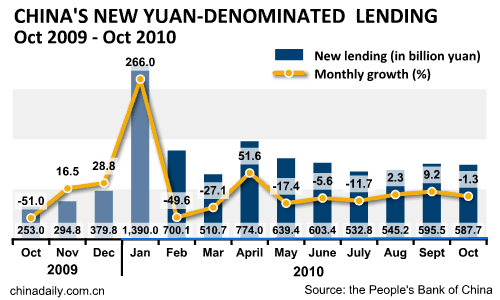Statistics
China's October new loans fall to 587.7b yuan
(Xinhua)
Updated: 2010-11-11 11:05
 |
Large Medium Small |

BEIJING -- China's new yuan-denominated lending in October dropped to 587.7 billion yuan ($88.5 billion) from 595.5 billion yuan in September, the People's Bank of China (PBOC), the central bank, said Thursday.
The figure was higher than market estimations of less than 500 billion yuan after the central bank lifted the required reserve ratio for six banks and surprisingly raised benchmark interest rates in October.
October's amount brought the combined new loans for the first 10 months to about 6.89 trillion yuan, compared with the 8.92 trillion yuan in the same period of last year.
China's banking regulator has taken measures to curb bank lending this year, targeting new yuan loans of 7.5 trillion yuan for the full year, down from last year's 9.6 trillion yuan.
Outstanding yuan-loans totaled 46.87 trillion yuan at the end of October, 19.3 percent higher than a year earlier, the PBOC said. The growth rate was 0.7 percentage points higher than that at the end of September.
China's broad money supply (M2), which covers cash in circulation and all deposits, increased 19.3 percent year-on-year to 69.98 trillion yuan by the end of October, compared with the 19 percent increase at the end of September.
Narrow money supply (M1), cash in circulation plus current corporate deposits, climbed 22.1 percent from a year earlier to 25.33 trillion yuan -- up from the 20.9 percent rise at the end of September.
China's banking regulator has taken measures to curb bank lending this year for fear that ample liquidity would trigger inflation and assets bubble. The government targeted new yuan loans of 7.5 trillion yuan for the full year this year, down from last year's 9.6 trillion yuan.
"October's new credit is more than the market expected and the overall lending would be at about 8 trillion yuan this year," said Liu Yuhui, an expert with the Institute of Finance and Banking at the Chinese Academy of Social Sciences.
He warned of too much liquidity in the future, saying price hikes would happen if no tightening measures were introduced.
Government data released Thursday showed the nation's consumer price index (CPI), a key measure of inflation, rose to a 25-month high of 4.4 percent in October from 3.6 percent in September.
From January to October, China's CPI rose 3 percent year-on-year, hitting the government's target ceiling for the year.
The government sent a signal over its concerns about mounting inflation by ordering banks to set aside an extra 50 basis points in reserves from Nov 16 for a fourth time this year on the night before the inflation data was released.
The move came after the central bank raised its benchmark one-year lending and deposit rate by 0.25 percentage points effective from Oct 20, the first such hike in almost three years.
Previous to that on Oct 11 the central bank ordered six banks including the four major State-owned lenders to keep an extra 50 basis points in reserves to control lending.
The central bank said in a report issued on Nov 2 that it would gradually normalize the monetary policy from its counter-crisis mode and tighten liquidity controls to maintain moderate credit growth in the coming months this year.
The government probably would introduce new tightening tools to mop up liquidity and prevent surges in product and asset prices, after the US announced a second round of quantitative easing last week, said Lu Zhiming, an analyst from the Bank of Communications.
This year the government has repeatedly warned commercial banks over financial risks for fear that overlending might cause more bad loans and threaten the country's financial security.
China's banking regulator said late October that the nation's commercial lenders should improve their balance sheets and reduce excessive reliance on lending for profits, which was unsustainable.
Guo Tianyong, head of the China Banking Research Center at the Central University of Finance and Economics, said commercial banks had to actively push forward business reform.
"Banks have pumped excessive money into the market, causing inflation pressure," he said, calling on banks to diversify their services away from simply focusing on lending.
 Real estate sector shows signs of cooling
Real estate sector shows signs of cooling


